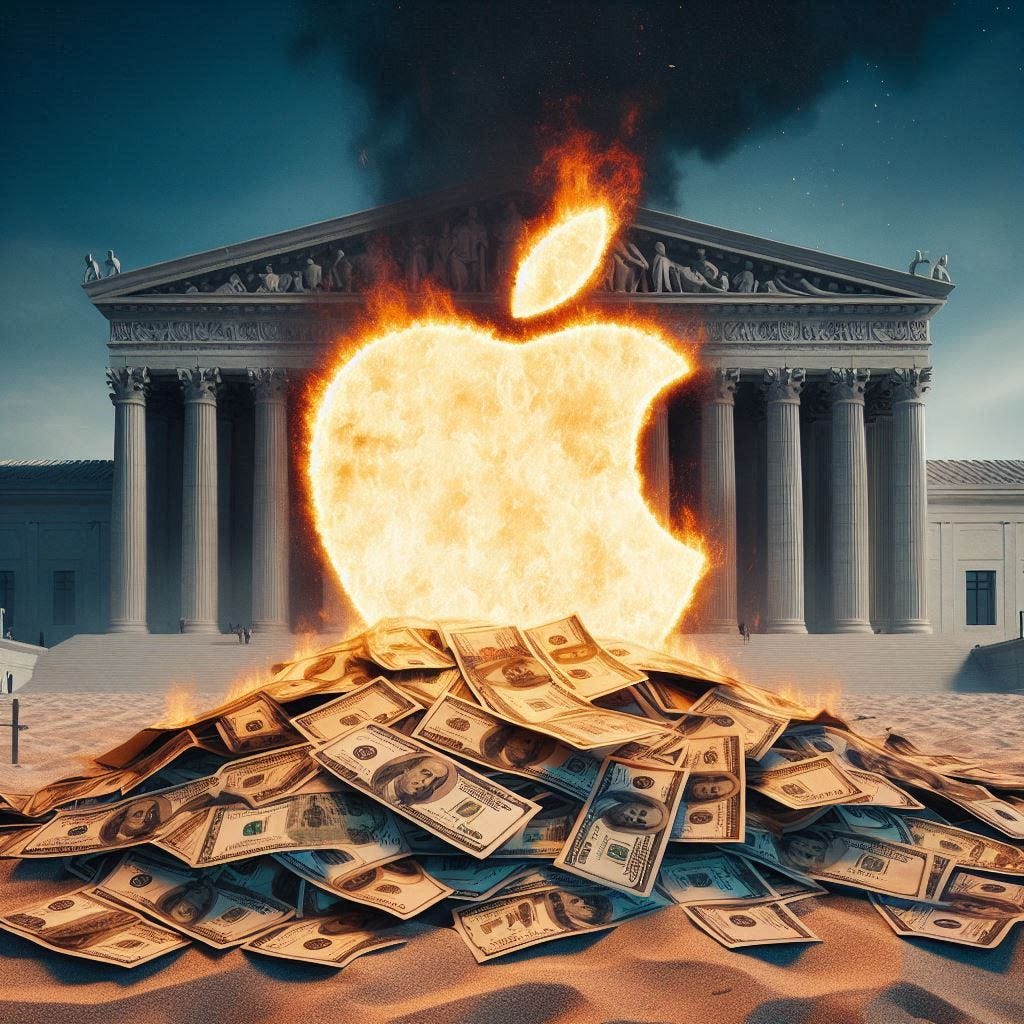Apple: Burning an Opportunity
Apparently, Google pays Apple $20 billion annually to be the default search engine when users open Safari. Apparently, the government has a problem with this. I get it on all sides… Obviously Google thinks it’s worth the money, Apple makes a ton of cash, and the government feels that since only Google (may) be able to fork over that much money, it’s an abuse of power in order to maintain market position.
However, those aren’t the real issues here. These are simply the things that have happened because of the real issue: A lack of consumer choice.
The issue is Apple’s monopolistic control, not Google’s practices.
While it is completely possible to change your default search engine in Safari and most other browsers, mobile or otherwise, very few people actually take the time to jump through the hoops to do so. Google wins by default, not necessarily by preference1.
The simple solution is easy: Enable consumer choice. This would remove Google’s ability to use it’s cash hoard to lock out other providers, thus removing the monopolistic capability and justification for legal actions against Google. The fact that consumers don’t have choice isn’t actually the result of Google’s behavior… It’s the result of Apple’s disinterest in providing consumers with highly visible and easy to use way to choose an alternative to Google.
The solution to this is incredibly simple… and is a massive opportunity that Apple is missing out on. Apple could provide consumers with choice while also potentially increasing revenue in this space by doing two things:
Present consumers with a first-launch list of options for their default homepage or service to select from.
Auction for placement on this list of options.
This solves all problems. Sure… while it’s likely that Google would out-bid nearly every other service for placement at the top of the list, an auction process wouldn’t necessarily guarantee such placement. Any service with sufficient resources (*cough* Microsoft *cough*) could out-bid Google for placement, thus defeating Google’s ability to lock out other vendors. Even if Google does successfullly bid for top position, consumer choice is still maintained because other services would still be present on the list, ordered by highest bidder. Google would never be the exclusive choice, even if it appeared to be the default by being at the top of the list… if it even won such a position.
“Then Google would bid less” one might say. Probably/Maybe. Maybe not. This would put Google in the competitive position of having to out-bid another company with similar resources for that top position (*cough* Microsoft *cough*) resulting in a potientially higher bid in order to defeat any secondary player. It may alternately cause Google to bid less because they may the result of consumer choice to be less than the current situation of being the absolute default. It could go either way.
This would still enable Apple to win as every service on the list would also be bidding (and paying) for placement. Apple would gain the sum total revenue from all bidders. The combined income could potentially far exceed what Apple makes from Google directly now. For example, if Google bids $15 billion instead of $20 billion, Microsoft may bid $10 billion, and perhaps DuckDuckGo may pay $5B2. Apple thus makes $30 billion vs. the existing agreement for $20 billion and resolves the issue of consumer choice at the same time. Apple makes an additional $10 billion, Google still gets top placement, other vendors have an opportunity to get involved, and consumers get a choice.
Everbody Wins… Especially Apple.
There might be some constraints on who could bid in such an auction. Creating an infinite list of providers would be unweildy to say the least and negatively impact consumer experience. The answer may be something like only allowing bids from services with at least 1% marketshare based on metrics from an independent 3rd party. This limits the number of bidders to those with real value in the marketplace and prevents the list of providers from being infinitely long. Apple still makes a hoard of cash from the even limited set of providers as those services also likely have the most resources with which to bid.
Apple is missing out on a massive opportunity to provide consumer choice while increasing potential revenue… and Apple looks like the good player working for consumer benefit. Apple needs to stop looking at the situation with such a myopic viewpoint and see the real opportunity in front of it. Everyone is missing out until they do.
I believe this creates very artificial useage metrics for Google, enabling them to advertise a higher percentage of web searches than were another default page/service be present (though till highly dominant… it’s funny how the #1 search phrase in Bing is “google[.com]”.)
I have no idea whether DuckDuckGo has these resources of would do this… this is all just for purposes of example.


